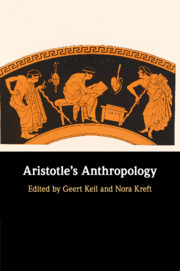Book contents
- Aristotle’s Anthropology
- Aristotle’s Anthropology
- Copyright page
- Contents
- Contributors
- Acknowledgements
- Introduction
- Part I Human Beings as Rational Animals
- Chapter 1 Aristotle on the Definition of What It Is to Be Human
- Chapter 2 Speech and the Rational Soul
- Chapter 3 Aristotle’s Peculiarly Human Psychology
- Chapter 4 The Planetary Nature of Mankind
- Part II Human Nature in the Light of Aristotle’s Biology
- Part III Aristotle’s Moral Anthropology
- Part IV Aristotle’s Political Anthropology
- Bibliography
- Index
Chapter 4 - The Planetary Nature of Mankind
A Cosmological Perspective on Aristotle’s Anthropology
from Part I - Human Beings as Rational Animals
Published online by Cambridge University Press: 27 May 2019
- Aristotle’s Anthropology
- Aristotle’s Anthropology
- Copyright page
- Contents
- Contributors
- Acknowledgements
- Introduction
- Part I Human Beings as Rational Animals
- Chapter 1 Aristotle on the Definition of What It Is to Be Human
- Chapter 2 Speech and the Rational Soul
- Chapter 3 Aristotle’s Peculiarly Human Psychology
- Chapter 4 The Planetary Nature of Mankind
- Part II Human Nature in the Light of Aristotle’s Biology
- Part III Aristotle’s Moral Anthropology
- Part IV Aristotle’s Political Anthropology
- Bibliography
- Index
Summary
In the following chapter I would like to draw the reader’s attention to a passage in Aristotle’s De Caelo that, to my mind, reveals some of Aristotle’s deeply rooted presuppositions about the role and the standing of human beings within the cosmos. Strictly speaking, the passage, which is in book II, chapter 12 of De Caelo, is not meant to discuss anthropological questions; it rather unfolds a comparison between celestial bodies and living beings. In the course of this comparison it turns out, somewhat surprisingly, that out of all the kinds of celestial bodies, it is the planets whose nature is most akin to that of mankind. Since explanation, both in Aristotle and in real life, proceeds from what is better known and more fundamental to what is less known and in need of an explanation – in the given case from living beings, such as plants, animals, and humans, to celestial bodies – the very idea of this comparison presupposes that there are certain facts about human beings that are relatively uncontroversial and are not themselves in need of explanation. Owing to this general setting we can be confident that the characteristics of human beings that Aristotle adduces are thought to be general truths about the human condition – although he does not really engage with the details and the implications of these supposed truths.
- Type
- Chapter
- Information
- Aristotle's Anthropology , pp. 77 - 96Publisher: Cambridge University PressPrint publication year: 2019
- 1
- Cited by



